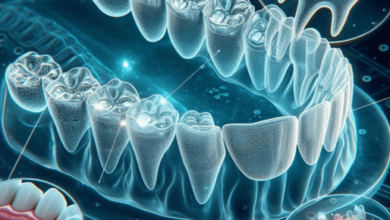
Stress is a part of life and it always tends to go hand in hand with city living, especially cities as chaotic as Atlanta. From work to family-related issues, money problems or other challenges can all contribute and stress can have a huge impact on both mental and physical well-being as suggested by Atlanta dentistry. Yet, one topic that is not often included in conversations about stress and its repercussions for physical health. The link between stress and oral health is profound, so understanding this connection is key to keeping your mouth healthy—and by extension the rest of you in great shape.
How Stress Impacts Oral Health
The body, when stress occurs in it, responds to its impact on oral health. Learn more about how stress can show up in your mouth.
1. Bruxism (Teeth Grinding)
One of the most common oral health issues related to stress is Bruxism, which tends not to be diagnosed but teeth grinding. Teeth grinding is when you clench or grind your tooth throughout sleep. All of these issues add up over time to create a variety of dental problems including:
- Tooth Wear and Injury: Grinding can damage the enamel, resulting in tooth sensitivity or even teeth breaking.
- Jaw Pain and Temporomandibular joint disorders (TMD): The long-term effects of clenching may also cause jaw pain; this can result in temporomandibular joint disorder as well which restricts the movement of a person’s jaw, making it difficult to open their mouth or chew.
2. Gum Disease
Stress can also lay waste to the immune system, which makes it more difficult for your body to resist infections caused by gums. This can lead to:
- Gingivitis: The earliest stage of gum disease, gingivitis causes redness, swelling, and bleeding in the gums.
- Aftermath of Gingivitis: If not addressed at early stages mild gingivitis can progress to the advanced form which is referred to as periodontal disease and it results in tooth detachment, along with associated risks like heart ailments and diabetes.
3. Dry Mouth (Xerostomia)
When people experience stress, it can bring a change in the hormone level of their body and ultimately reduce saliva production. An unprotected dry mouth is not only uncomfortable but also more prone to:
- Cavities: Saliva helps wash away food particles and it neutralizes the acids produced by bacteria in your mouth. When saliva is not present to protect it, the coloring makes things worse.
- Bad Breath: With no saliva to cleanse your mouth, bad bacteria have free reign. And they tend to cause that notorious “morning breath” odor we all loathe so much!
4. Canker Sores
Stress is thought to have a major role in the development of canker sores, while the precise origin of the condition is yet unknown. The following factors may cause these tiny, excruciating ulcers to develop on the interior of the mouth:
- Reduction in Immune Response: The immune system may become weak during periods of stress, which can make the mouth vulnerable to canker sore formation. Stress can also cause poor eating habits, such as more acidic or spicy food that worsens unwanted sores.
Although stress is an inevitable aspect of life, its effects on dental health should not be disregarded. You can safeguard your general health and oral health by being aware of how stress impacts the mouth and adopting proactive measures to control it. Do not hesitate to contact your Atlanta dentist for individualized guidance and treatment options if you are having problems with your dental health that are connected to stress. Keep in mind that having a healthy smile is crucial to your general health and not simply for appearance.



